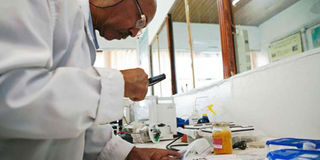New discovery raises hope for malaria battle in chicken

Medical entomologist and vector biologist at the department of Zoological Sciences of Addis Ababa University Dr Habte Tekie examines a specimen at his laboratory in Addis Ababa on July 25, 2016. Ethiopian scientists have discovered mosquitoes are repulsed by the smell of chicken, raising hopes for the development of a novel way to prevent a disease that kills hundreds of thousands every year. PHOTO | AFP
What you need to know:
- Tests carried out in three villages in western Ethiopia showed that families that slept beneath a chicken in a cage overnight were mosquito-free in the morning.
- Malaria threatens 60 per cent of the population of Ethiopia, a nation of almost 100 million people.
- An off-patent malaria drug could help to destroy cancer cells by making them more susceptible to radiotherapy has prompted British scientists to start a clinical trial.
ADDIS ABABA
Ethiopian scientists have discovered mosquitoes are repulsed by the smell of chicken, raising hopes for the development of a novel way to prevent a disease that kills hundreds of thousands every year.
A team of insect experts led by Professor Habte Tekie at the University of Addis Ababa began their investigation after noticing that mosquitoes bite humans and other animals but stay away from chickens.
“We went into the chemical basis involved in repelling malaria mosquitoes by odours emanating from the chickens... The results show that compounds from chicken have very good potential as repellent,” Tekie told AFP.
One theory for their behaviour is that mosquitoes see chickens as a predator, so seek to avoid them, he said.
Tests carried out in three villages in western Ethiopia showed that families that slept beneath a chicken in a cage overnight were mosquito-free in the morning, while homes without indoor poultry were not.
The obvious challenges of sleeping with a bird suspended over the bed were addressed in a follow-up experiment in which villagers were supplied with vials of chicken extract. The results were similar.
The findings, recently published in the medical publication Malaria Journal, will be used in a new collaboration with Swedish scientists to develop an odourless repellent.
“This repellent will be safe for human use, (with) no residues contaminating soil or water or poisoning people and it can easily be integrated into malaria control operations,” Prof Tekie said.
Malaria threatens 60 per cent of the population of Ethiopia, a nation of almost 100 million people.
The chicken stock with a difference will be “entirely natural,” according to the scientist, and the chance of mosquitoes developing resistance is “minimal”. There is currently no vaccine against malaria, and the disease killed 438,000 people in 2015, according to the latest figures from the World Health Organisation.
DESTROY CANCER CELLS
Meanwhile, an off-patent malaria drug could help to destroy cancer cells by making them more susceptible to radiotherapy, according to early work, has prompted British scientists to start a clinical trial.
Researchers reported on Monday that atovaquone boosted oxygen levels in tumour cells in mice, making radiotherapy more effective against a range of cancer types, including lung, bowel, brain and head and neck cancer.
Cancer cells with low oxygen levels are more difficult to treat with radiotherapy and are more likely to spread to other parts of the body.
“We have now started a clinical trial ...to see if we can show the same results in cancer patients,” said lead researcher Gillies McKenna of the Cancer Research UK Radiation Research Centre in Oxford.
The findings, recently published in the medical publication Malaria Journal, will be used in a new collaboration with Swedish scientists to develop an odourless repellent.
The fact that such drugs are already off patent means they are cheap, but the lack of patent protection is also a potential problem because drug companies investing in late-stage research have less certainty of a commercial payback.
Atovaquone is used to both treat and prevent malaria. It is usually prescribed to travellers as Malarone, a combination of atovaquone and proguanil developed by GlaxoSmithKline.
“We hope that this existing low-cost drug will mean that resistant tumours can be re-sensitized to radiotherapy’’. he said.





